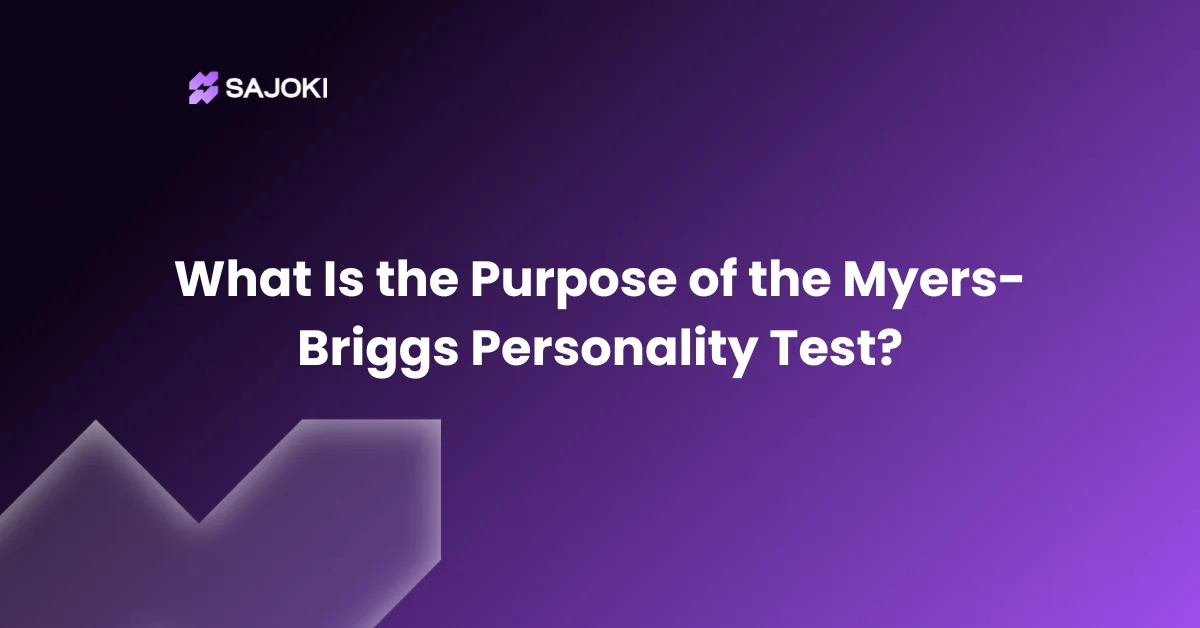The Myers-Briggs Type Indicator has gained worldwide recognition for its effectiveness and success. Nevertheless, the purpose of the MBTI is often undermined by its success. Yet, knowing the reason behind its creation is crucial for using it correctly.
So, what is the purpose of Myers-Briggs Personality Test?
The MBTI helps people understand their natural preferences and appreciate differences in others. Its core purpose is self-discovery and building empathy, not clinical diagnosis or hiring. As a result, empowering individuals to navigate relationships, careers, and growth more effectively.
In this blog, we will dive deep into the purpose of the MBTI. Moreover, we will check out the purpose differences between MBTI and other personality tests to get a clearer picture. Lastly, the common misuses of the MBTI so you can avoid them. Let’s go!
What Is The Purpose Of Myers-Briggs personality Test?
The Myers-Briggs Type Indicator (MBTI) was first meant for purposes beyond simple personality categorization.
It was designed during World War II by Katharine Cook Briggs and her daughter Isabel Briggs Myers. The exam was first intended to assist women entering the industrial sector to find “the most comfortable and effective” job for them.
Isabel was driven by a deeper goal: she thought that better understanding among individuals would lead to more cooperative behavior and less conflict.
However, she didn’t realise what they had built and would go this far for ages. So let’s check out what is the purpose of Myers Briggs personality test is that has brought it so far in time. There has to be something with a purpose that has driven it so far.
1. Helping People Understand Themselves
Fundamentally, the MBTI was developed as a self-discovery toolkit. Unlike certain psychological tests of the day, it was not designed to find abnormality or dysfunction.
Rather, it gives people a language to communicate their inner selves and sense of natural preferences.
Katharine Briggs saw the test as a spiritual journey; she thought that human satisfaction depended on finding your actual self.
Moreover, the MBTI underlines that every personality type has special worth and strengths; none of them is “better than another”.
Through this self-awareness, individuals can:
- Acknowledge their tastes and preferences
- Value their natural strengths
- Identify potential areas for personal growth
- Navigate life’s changes and obstacles better
2. Better Relationships
The MBTI test explains why people behave and talk differently. Understanding these variations helps one to develop empathy and lowers conflict.
Moreover, it clarifies, for instance, why someone you know requires alone time (introvert) or why a colleague emphasizes facts above thoughts. This smooths out personal interactions and collaboration.
3. Find Work You Like
The MBTI is not an employment test. However, it can point you in the right direction. It shows the possible suitable working environments for you.
Do you like fast change or clear structure? Do you enjoy big ideas or practical tasks? Does team harmony or efficiency attract you?
Once answered, this guides your search for employment that complements your style. Overall, it can increase job satisfaction.
4. Make Teams Work Well
Every team has different people from different cultures. The MBTI helps teams see this diversity. It shows everyone’s natural strengths. While one person sees the big picture, another notices important details. One person makes logical choices, another understands people’s needs.
Once team members know how others think in the team, they can use this diversity as a strength. They can talk to each other clearly, assign tasks to someone’s strong points, and solve problems together.
5. Helps with Development and Growth as an Individual
Knowing your type is just the start. The MBTI helps you grow as you can practice new skills by knowing your strengths and weaknesses.
A logical person can practice kindness, a planner can try going with the flow, and a quiet person can try speaking up. Overall, it helps you to become a more balanced person.
6. The Biggest Lesson: Teaching All Types Are Good
The biggest lesson that the MBTI test teaches us all is that all personality types are good. No personality type is best, nor is any personality type the worst.
Being organized is useful. Being flexible is useful too. Similarly, loving facts is important, yet imagining possibilities is also important.
The test helps us appreciate differences. As a result, making us realize that we all bring something special to the table.
MBTI vs Other Personality Tests In Terms of Purpose
The Myers-Briggs Type Indicator was created for purposes that fundamentally differ from other personality assessments.
Knowing these purpose differences enables one to understand why MBTI has stayed relevant for decades. Moreover, how they are catering to unique roles in personal and professional development. Let’s start with a summarized table.
| Aspect | MBTI | Other Personality Tests |
| Primary Purpose | Self-empowerment and understanding | Clinical diagnosis or research |
| Main Goal | Help people recognize and value their natural preferences | Measure psychological qualities or identify behavioral issues |
| Focus | Building understanding between people | Measuring performance or aptitude |
| Approach to Results | All types are equal, no rankings | Often rank individuals or compare them to others |
| Target Audience | Everyone seeking better relationships and personal growth | Specific professional or clinical purposes |
| Use Cases | Personal development, team building, and relationship improvement | Hiring decisions, therapy planning, and research studies |
| Outcome | Reduces conflict through appreciation of differences | Evaluates fitness for specific roles or identifies problems |
| Result Interpretation | Starting point for self-awareness and growth | Diagnostic tool with relatively fixed conclusions |
Now, let’s dig in deep with the differences.
1. Self-Empowerment vs. Clinical Diagnosis
Most personality tests are used clinically or for research. They either measure psychological qualities for academic study or diagnose mental health issues, or identify behavioral difficulties.
On the other hand, the goal of MBTI is quite different. It was created to empower people with self-knowledge.
While tests like the MMPI-2 seek to spot psychological illnesses, the MBTI’s goal is to enable individuals to recognize and value their own natural psychological preferences.
2. Building Understanding vs. Measuring Performance
Often serving evaluative purposes, traditional tests measure aptitude, intelligence, or psychological fit for particular jobs. On the flip side, MBTI explicitly opposes this purpose.
It was never meant to assess someone’s “wellness” or how “good” they consider their extroverted nature. Its objective is rather to foster mutual understanding between individuals by means of appreciation of diversity. AS a result, reducing conflict.
3. Promoting Equality vs. Creating Rankings
Many personality tests rank individuals or find who has “more” of specific characteristics. Therefore, it serves both comparison and analytical roles. The Big Five personality test, for instance, measures your relative performance to others.
The bold goal of the MBTI was to prove that every personality type has equal value. It does not rank types or claim some are better than others.
4. Lifelong Development vs. Fixed Assessment
Some personality tests have diagnostic value with somewhat fixed results. It means that once you are evaluated, the results outline limits or capabilities.
The objectives of the MBTI focus more on expansion and improvement. At first, it offers a foundation for self-awareness and then motivates you to recognize your natural preferences. This helps you to grow every aspect of your personality throughout life.
5. Universal Application vs. Specialized Use
Clinical assessments typically serve specific professional purposes. This includes hiring decisions, therapy planning, or research studies.
On the other hand, the MBTI was intended to be helpful for everyone looking for improved relationships, job fulfillment, or personal development. Its democratic goal makes it reachable to people in all spheres of life.
This intentional difference clarifies why MBTI keeps working toward its initial goal of improving understanding among individuals instead of just classifying or assessing them.
4 Common Misuses of MBTI That Go Against Its Purpose
The Myers-Briggs Type Indicator was clearly developed with good intentions of encouraging understanding and lowering conflict. However, it is sometimes utilized in ways that clearly contradict its original objective.
These misuses not only compromise the effectiveness of the test but also directly lead to the very issues it was meant to solve. Here they are;
1. Using MBTI for Hiring and Firing Decisions
Using MBTI as a hiring tool is among the most uneasy uses. Some companies use it to evaluate applicants or decide whether to promote someone. This is because they think particular candidates are “better” for particular positions.
This completely violates MBTI’s core principle that all types have equal value and unique strengths. Thus, even though it might work well in this scenario, it is against the reason why the Briggs family developed this test.
2. Creating Stereotypes and Limiting Beliefs
Some people use MBTI results to justify limitations or avoid growth. Saying things like “I’m an introvert, so I can’t be a leader” or “I’m a thinking type, so I don’t need to consider emotions” totally misses the point.
Designed to assist individuals in recognizing their starting preferences, the MBTI was not meant to produce permanent boxes.
People are working against the test’s goal of encouraging personal development and balanced development. This is especially true when they use their type as an excuse to avoid acquiring new skills.
3. Treating MBTI as the Absolute Truth
Some people grow so dependent on their type that they view it as an unchangeable identity instead of a tool for knowledge of preferences.
Because it doesn’t fit their type description, they may object to comments or refuse to take different points of view. This inflexible thinking restricts the self-awareness and development MBTI was meant to inspire.
4. Dismissing Others Based on Type
People who utilize MBTI to discredit or degrade others participate in another negative misuse.
Comments like “Oh, you’re just being emotional because you’re a feeling type” grow more division than clarity. This runs counter to MBTI’s basic goal of creating connections between several personality preferences.
The evaluation should enable us to value diversity rather than weaponize it by ignoring the viewpoint of others.
FAQ
1. How often should I retake the MBTI test?
Your type doesn’t really change, but you might want to retake it every few years. This is especially true during big life changes like starting a new career or going through personal growth.
2. Can my MBTI type change over time?
Not really. Your basic preferences stay the same, but you can get better at using skills that don’t come naturally.
3. Can kids take the MBTI test?
The official test is for adults 18 and up. Kids’ personalities are still developing, so their results might not be accurate. There are special versions for younger people. But remember, kids change a lot as they grow.
Conclusion
To conclude, we hope you got the answer to what is the purpose of Myers Briggs personality test is. Undoubtedly, the MBTI has one of the highest success rates in the industry. However, most of us are using it against the purpose it was made.
In essence, the MBTI was made to build self-awareness, make relationships better with others, and construct empathy for each other. However, most of us are using it to create distinctions between individuals.










